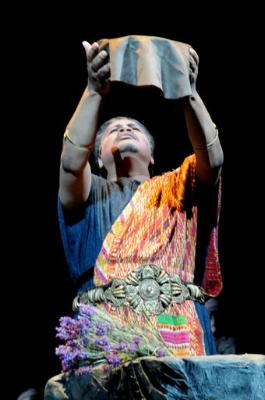|

Magical Eloquence
The first night of Palm Beach Opera's
revival of Bellini's 'Norma'
provides a night to remember
for LAWRENCE BUDMEN
Vincenzo Bellini's Norma is one of the glories of Italian bel canto. While Felice Romani's convoluted libretto about druids, Roman occupiers and priestesses breaking their vows is almost impossible to take seriously, let alone stage as coherent music drama, Bellini's glorious outporing of endless melody can sail on wings of song in an inspired performance. All that is needed to make Norma take flight is four superbly endowed vocalists. Palm Beach Opera fielded just such a stellar cast in its recent revival (seen on opening night, 23 January 2009 at the Kravis Center in West Palm Beach, Florida, USA).
The title role is one of the most demanding in the repertoire -- the Italian equivalent of a Wagnerian soprano with a fluent coloratura extension. (Rosa Ponselle, Zinka Milanov, Maria Callas, Joan Sutherland and Montserrat Caballé have excelled as Bellini's tragic heroine.) American soprano Elizabeth Blancke-Biggs, one of New York's most highly regarded voice teachers, has an impressive international career resumé. (She has specialized in such formidable roles as Maria Stuarda and Abigaille in Nabucco.) Blancke-Biggs was every inch Bellini's imperious druid priestess. Her sizable dramatic soprano was equally flexible in stentorian declamation and radiant cantilena. Opening with a broadly phrased Casta diva, the soprano went from strength to strength, negotiating the composer's coloratura leaps and roulades with ease. Yet it was her soft, exquisitely burnished singing that melted the heart. A mistress of Bellini's long, arching vocal line, she made Norma's final sacrifice deeply moving; the heartbreaking final duet with tenor Renzo Zulian soaring into magical eloquence.
Palm Beach Opera artistic director Bruno Aprea boldly chose to present Bellini's alternative version of the opera for two sopranos -- the mezzo role of Adalgisa assigned to the higher voice. Ruth Ann Swenson was a model of flawless agility, subtle expressivity and impassioned fervor. A distinguished Violetta, Gilda and Lucia, this superb coloratura soprano brought a darker, mellifluous tonal compass to her always lovely instrument. In the duet Mira, o Norma and succeeding cabaletta, Swenson and Blancke-Biggs produced the kind of gorgeous, seamlessly produced vocalism of which legends are made. The first night audience awarded vociferous, cheering ovations to both artists -- two sopranos who are truly at the top of their artistic powers.

Luiz Ottavio Faria as Oroveso in 'Norma' at Palm Beach Opera. Photo © 2009 Alissa Dragun
|
Noble of bearing, Zulian exuded manly, virile vocalism in the stock role of the Roman proconsul Pollione. A pupil of Franco Corelli (who sang and recorded the opera with Callas), Zulian more than once evoked that legendary tenor's gloriously ringing instrument. As Oroveso, the inevitable druid high priest, Luis Ottavio-Faria unleashed a deep, sonorously flexible basso cantante. With a forthcoming La Scala début as Banquo in Verdi's Macbeth, he is a very promising singer. The young tenor Rolando Sanz revealed a lyric tenor of impressive purity as the centurion Flavio.
Opening with a fiery reading of the overture, Aprea conducted a high intensity performance that gave equal weight to soaring, long limbed vocal lines and stirringly bombastic choral outbursts. Greg Ritchey's vibrant chorus and the excellent orchestra (led by former New York Philharmonic, Dallas and Cincinnati Symphony concertmaster Eliot Chapo) performed with hair trigger precision. With a terrific cast and an idiomatic Italian conductor bringing incendiary fervor to Bellini's timeless masterpiece, this Norma was a night at the opera to remember.
Copyright © 28 January 2009
Lawrence Budmen, Miami Beach, USA

Palm Beach Opera presents Mozart's Le Nozze di Figaro, conducted by Bruno Aprea, from 27 February until 2 March 2009. Puccini's La bohème, conducted by Guido Ajmone-Marsan and directed by Renata Scotto, concludes the company's season from 3-6 April. For information, see www.pbo.org |
|

